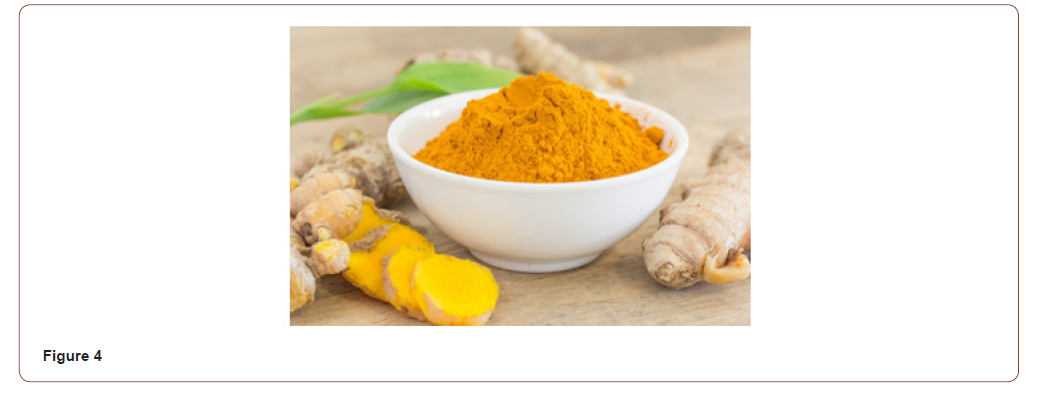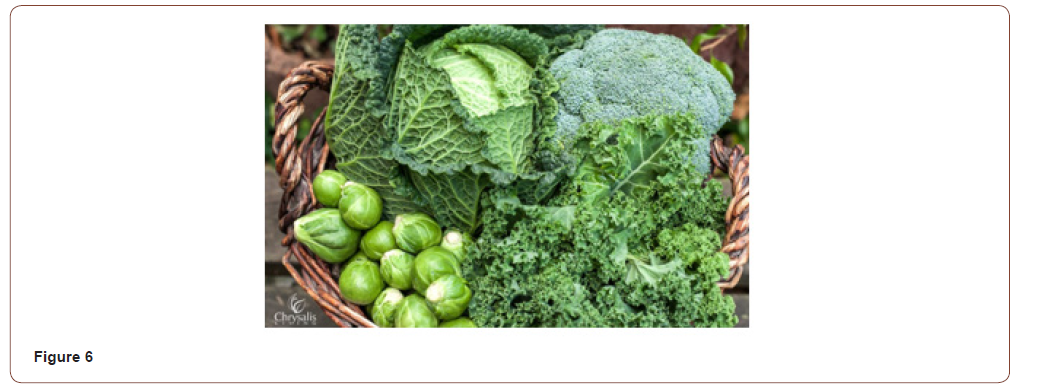 Opinion article
Opinion article
Covid-19 Vaccination Side Effects and Foods That Can Help
Dr. Diane Best*
Department Chair-Hospitality & Culinary Management, Jacksonville State University, USA
Dr. Diane Best, Department Chair -Hospitality & Culinary Management, Jacksonville State University, Alabama, USA.
Received Date: February 23, 2021; Published Date: March 02, 2021
Introduction
The year 2020 was awash with Covid-19 (also known as the corona virus) contraction numbers, details, and death tolls. As a country, we are now moving into a new stage as more people receive the Covid-19 vaccine. There have been lots of myths and fallacies regarding the vaccine such as “when a person gets vaccinated a microchip is implanted with spying capabilities” or “the vaccine will give you the virus.” I am happy to say that none of these urban legends are true. However, with all the talk about Covid-19 vaccines and how one will feel afterward, focusing on foods that sooth the body and make you feel better after being vaccinated is a positive, proactive way to help your body recover and perhaps ease your mind just a little. Food does not just nourish the soul; it also has many healing properties that can give your body a boost and may help to prevent and manage some symptoms [1].
Effects of Covid-19 Vaccinations
First, let us try to understand the Covid-19 vaccine a little more. According to Dr. Marlene Millen, Chief Medical Information Officer, Ambulatory & Primary Care Physician at UC San Diego Health, the vaccine cannot cause contraction of Covid-19, no more than the flu vaccine can give you the flu. Your first Covid-19 vaccination will likely cause you to have soreness in the vaccination area, perhaps a low-grade fever or chills. Acetaminophen (Tylenol©) is a sufficient pain reliever and will cause one to feel better overall. Dr. Millin suggests that these symptoms will last approximately 24-48 hours [2].
The Center for Disease Control and Prevention states that the second round of the Covid-19 vaccine has aftereffects that are somewhat stronger. They stated that “people who get the second dose of the COVID-19 vaccine experience more frequent and severe side effects as opposed to when they receive the first dose. That includes sometimes headache, sometimes fever or even body malaise or kind of fatigue [3].” The CDC also made clear that younger people are more impacted by the side effects after the second dose than older people are [3].
Dr. Emmanuel Sarmiento, MD is an Allergy & Immunology Specialist in Greenville, SC. He explained that you “should not do any strenuous activities, stay rested, hydrate and take your Tylenol.” He also stated that “the first dose is given to have the body build up the immune response, while the second dose is given to boost that response.” This means that your body is reacting and the symptoms you are experiencing are in response to the vaccine. Dr. Sarmiento also stated that “you may have more symptoms from the second dose because that’s when you are producing a lot of antibodies.” He also states that while the first 30 minutes after the shot is when most severe allergic reactions could take place, he also adds that while temporary and manageable, the other side effects could last for 24-48 hours [4].
Dr. Greg Poland, Director of the Mayo Clinic’s Vaccine Research Group, said he suffered five hours of shaking chills, fever up to 101 degrees, severe headache, nausea, ringing in his ears and a sore arm after getting his booster dose of the Moderna vaccine. Poland explained that the second dose is amplifying the lessons of the first dose, which taught your body how to recognize the coronavirus as an enemy. “We should stress it doesn’t mean that anything’s going wrong or that something bad is happening. It is an expected reaction to the vaccine, and it will be different between different people. It is evidence of a vigorous immune response, which doesn’t mean that people who have less of a response are not developing an immune response. They are,” Poland added. “But for some of us, for whatever reason, our immune system sees this and really reacts to it” Poland said [5].
According to the U.S. Food and Drug Administration, both Moderna and Pfizer noted a more intense reaction to the second dose in their volunteers. Moderna specifically noted that “Grade 3” side effects swelling, pain, body aches, headache and fever were more frequently reported after the second dose than the first [6]. Now that we understand how the vaccine works and how it can potentially affect us, lets discuss ways to mitigate some of the symptoms and reactions associated with the Covid-19 vaccines.
Foods That Will Sooth Symptoms
According to the World Health Organization (WHO), the immune system requires the support of many nutrients. It is recommended to consume a variety of foods for a healthy and balanced diet, including whole grains, legumes, vegetables, fruits, nuts, and animal source foods [7]. There is no food that will stop anyone from catching Covid-19. There are, however, some foods that have been known to help one feel better after getting the second vaccine. Inflammation is one of the main culprits when it comes to the kind of discomfort one feels after the Covid-19 vaccines. According to verywellhealth.com, “inflammation is the immune system’s natural response to injury or illness. When you are injured or become sick, your white blood cells release inflammatory chemicals into the blood and affected tissues to protect the body from foreign invaders, such as bacteria and viruses [8]. Based on this information, after the vaccine is administered, the body goes into “fight” mode as something foreign has been introduced. There are foods that help to diminish inflammation and in turn, can make you feel much better.
Blueberries

Blueberries are an excellent source of antioxidants and while they can also sooth your sweet tooth, they also fight inflammation. Adding these to your unsweetened yogurt makes for a snack that will not only change your mood as they are known to also increase serotonin which is the hormone that balances your mood. The decrease in inflammation will help to make you feel much better after your vaccine [9,10].
Bone Broth
Bone broths and clear soups have plenty of nutrients and have been known to have major soothing effects. Because of this, bone broths will most certainly will make you feel better after your second Covid-19 vaccine. Consumer Health Digest tells us that bone broths help improve joint health due to the increased level of collagen it contains and gives the immune system a boost. Inedible animal parts such as bones and marrows along with tendons, ligaments, skin, and feet of beef, chicken, lamb, fish, and pork are boiled then simmered with fresh vegetables for an extended period. The result is a broth that is rich in nutrients and flavor and is easily digestible [11].
According to WebMD, A clear broth is warm and soothing, making it a great source of hydration while you are sick. Broths made with chicken are also high in tryptophan, which causes your body to produce serotonin, a mood enhancer and give you the feeling of comfort [12]. Jada Murray, a registered and licensed dietitian and instructor at Jacksonville State University in Jacksonville, Alabama states that “broths that are made with vegetables like carrots, onions and celery have vitamin K and vitamin C, and other minerals and antioxidants. These helps decrease inflammation, relax your muscles, and soothe the discomforts of cold or flu like symptoms, as well as build up a person’s immune system to help fight off viruses and help your body recover from illness more quickly [13].

Green Tea

Green tea is known as a superfood that offers an array of benefits. As one of the healthiest beverages on the planet, its most prevalent benefit is that is overflowing with polyphenol antioxidants that are known to reduce inflammation in the body. This is the very reason why green tea is a good bet for making your second Covid-19 vaccine easier to manage. According to Health.com these antioxidants proactively protect cells from damage which makes it a superfood that offers a wide range of health protections and benefits. Green tea antioxidants also offer antibacterial, antifungal, and antiviral effects that support immunity [14].
Turmeric

Turmeric is another superfood that can go a long way to ease the symptoms of the Covid-19 vaccinations. Curcuma longa better known as Turmeric, is a spice used for cooking, however, it has gained enormous popularity as one of a handful of powerful herbs for fighting various diseases. According to News-Medical. net, Betsaida B. Laguipo, a nutritionist who discusses the health benefits of turmeric, states that “turmeric contains more than 100 chemical compounds that contribute to its healing abilities. The best-known health benefit of turmeric is its anti-inflammatory and antioxidant properties, giving it the power to alleviate swelling and pain. Inflammation is a very common cause of pain and discomfort” [15]. The National Library of Medicine-National Institutes of Health says that turmeric “has been shown to be one of the best foods to maintain, protect, and boost immunity, reducing the risk of falling ill. It also has antiviral, antibacterial, and antimicrobial properties and can be used for pain relief. The curcumin that is found in turmeric is a potent antioxidant that can help neutralize free radicals and boost the activity of antioxidant enzymes in the body [16]. It can be added to tea, smoothies, soups, and salads.

Salmon, particularly wild caught salmon has lots of properties that can assist you in feeling better after your Covid-19 vaccines. While salmon is a great source of protein and Vitamin B as well as others, it also is one of the best sources of the long-chain omega-3 fatty acids EPA and DHA. Farm raised salmon is also a good source of these acids, but wild salmon contains at least 0.3 additional grams. Omega-3 fats can only be received via your diet as the human body cannot create them. Salmon as well as other fatty fish can help lower inflammation significantly, which helps to curtail risk factors for a few diseases and boost recovery in people with inflammatory conditions [17].
Green Vegetables

Another reason to eat your green vegetables is because the antioxidants in them could make your recovery from the Covid-19 vaccines much easier. Making sure we eat our vegetables is something parents have been preaching for decades, but with good reason. According to Jada Murray, a registered and licensed dietitian and instructor at Jacksonville State University in Jacksonville, Alabama, green vegetables (such as kale, broccoli, collards, and spinach) have high levels of antioxidants that help greatly to fight bodily inflammation. An antioxidant called sulforaphane, which is found in broccoli, helps to combat inflammation. Green vegetables are tremendous sources of beta-carotene, vitamin A, vitamin C, vitamin K, magnesium, potassium, as well as a host of other vitamins that are helpful. Ms. Murray also added that green leafy vegetables help your body in various ways such as boosting immunity, preventing infections, weight control and others.
Conclusion
While quite a few people experience no side effects from the Covid-19 vaccine, there are those that have reported some reactions like fatigue, aches, headaches, chills, and some even report fevers. The CDC says that that “you may have some side effects, which are normal signs that your body is building protection. These side effects may affect your ability to do daily activities, but they should go away in a few days [18]. Based on the information we have, the best way to get through the vaccine side effects will be to soothe the inflammatory immune response by focusing on foods that eliminate inflammation.
Acknowledgement
I would like to acknowledge and thank my colleague Ms. Jada Murray, MDA, RDN, LD from Jacksonville State University for her assistance.
Conflict of Interest
No conflicts of interest.
References
- Saran R, Li Y, Robinson B, Abbott KC, Agodoa LYC, et al. (2016) US Renal Data System 2015 Annual Data Report: Epidemiology of Kidney Disease in the United States. Am J Kidney Dis 67(3): S1-S305.
- Li L, Kalantar-Zadeh K (2013) Obesity that makes kidney cancer more likely but helps fight it more strongly. J Natl Cancer Inst 105(24): 1848–1849.
- Paniagua R, Amato D, Vonesh E, Correa-Rotter R, Ramos A, et al. (2002) Effects of increased peritoneal clearances on mortality rates in peritoneal dialysis: ADEMEX, a prospective, randomized, controlled trial. J Am Soc Nephrol 13(5): 1307-1320.
- Eknoyan G, Beck GJ, Cheung AK, Daugirdas JT, Greene T, et al. (2002) Effect of dialysis dose and membrane flux in maintenance hemodialysis. N Engl J Med 347(25): 2010-2019.
- Park J, Ahmadi SF, Streja E, Molnar MZ, Flegal KM, et al. (2014) Obesity paradox in end-stage kidney disease patients. Prog Cardiovasc Dis 56(4): 415-425.
- Kalantar-Zadeh K, Rhee CM, Amin AN (2014) To legitimize the contentious obesity paradox. Mayo Clin Proc 89(8): 1033-1035.
- Kalantar-Zadeh K, Rhee CM, Chou J, Ahmadi SF, Park J, et al. (2017) The Obesity Paradox in Kidney Disease: How to Reconcile it with Obesity Management. Kidney Int Rep 2(2): 271-281.
- Friedman AN, Wolfe B (2016) Is Bariatric Surgery an Effective Treatment for Type II Diabetic Kidney Disease. Clin J Am Soc Nephrol 11(3): 528-535.
- Ahmadi SF, Zahmatkesh G, Ahmadi E, Streja E, Rhee CM, et al. (2015) Association of Body Mass Index with Clinical Outcomes in Non-Dialysis-Dependent Chronic Kidney Disease: A Systematic Review and Meta-Analysis. Cardiorenal Med 6(1): 37-49.
- Yao Q, Lindholm B, Stenvinkel P (2004) Inflammation as a cause of malnutrition, atherosclerotic cardiovascular disease, and poor outcome in hemodialysis patients. Hemodial Int 8(2): 118-129.
- Qureshi AR, Alvestrand A, Divino-Filho JC, Gutierrez A, Heimbürger O, et al. (2002) Inflammation, malnutrition, and cardiac disease as predictors of mortality in hemodialysis patients. J Am Soc Nephrol 2002 13(1): S28-S36.
- Park J, Rhee CM, Sim JJ, Kim YL, Ricks J, et al. (2013) A comparative effectiveness research study of the change in blood pressure during hemodialysis treatment and survival. Kidney Int 84(4): 795-802.
- Jandacek RJ, Anderson N, Liu M, Zheng S, Yang Q, et al. (2005) Effects of yo-yo diet, caloric restriction, and olestra on tissue distribution of hexachlorobenzene. Am J Physiol Gastrointest Liver Physiol 288(2): G292-G299.
- Rauchhaus M, Coats AJ, Anker SD (2000) The endotoxin-lipoprotein hypothesis. Lancet 356(9233): 930-933.
- Beddhu S, Pappas LM, Ramkumar N, Samore M (2003) Effects of body size and body composition on survival in hemodialysis patients. J Am Soc Nephrol 14(9): 2366-2372.
- Glanton CW, Hypolite IO, Hshieh PB, Agodoa LY, Yuan CM, et al. (2003) Factors associated with improved short term survival in obese end stage renal disease patients. Ann Epidemiol 13(2):136-143.
- Johansen KL, Kutner NG, Young B, Chertow GM (2006) Association of body size with health status in patients beginning dialysis. Am J Clin Nutr 83(3): 543-549.
-
Dr. Diane Best. Covid-19 Vaccination Side Effects and Foods That Can Help. 3(3): 2021. GJNFS.MS.ID.000562.
-
Covid-19 vaccines, Tylenol, Allergy, Immunology, Antibodies, Green tea antioxidants, Weight Control, Diminish Inflammation, Illness, Antiviral
-

This work is licensed under a Creative Commons Attribution-NonCommercial 4.0 International License.






